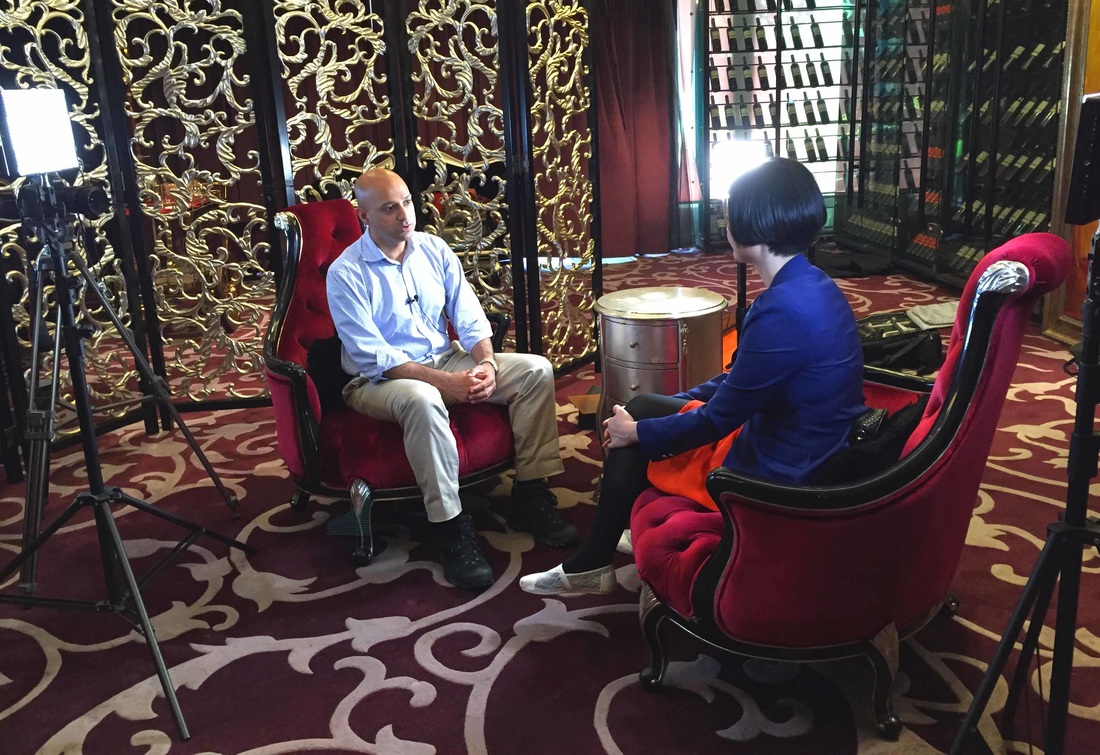|
In a world that has become digital and where media outlets are competing to report honest and reliable news that is delivered accurately and with speed, the question on everyone’s minds is, what is the future of news? This was exactly the topic of discussion at an event hosted by Thompson Reuters earlier this week, where panellists discussed how audiences of tomorrow will consume and engage with journalism, which platforms and formats will dominate, what tomorrow’s news will look and sound like and how it will be monetised.
Navjot Singh, editor of 12ahead.com at The Knowledge Engineers, attended the live discussion held at the EMEA HQ of Thomson Reuters in London on the 1st of June. The event, named ‘Tomorrow’s News’, was a follow-on industry discussion that derived from an important survey by Reuters.com into the news reading habits of over 1,200 of the site’s users, which was released earlier on the same day that the panel discussion was held. The publication’s digital executive editor Aron Pilhofer from the Guardian said it was “doubling down” on paid-for membership after signs of decline in digital display advertising within the industry. Eighty-four per cent of respondents of the survey said they were interested in receiving breaking news, and 85 per cent of them said they do so by checking multiple sources. The survey also highlighted that when it comes to people's desire to pay for quality news – 62 per cent of those surveyed agreed they would not consider paying. The research also sheds some light on what digital trends and new technology formats are likely to influence how younger Reuters.com readers will consume news in the future, with over ninety-three per cent agreeing that the increasing power of mobile devices will play an important role, while 88 per cent also cited mobile app development as a factor. Apart from Pilhofer, panellists at the discussion, which was broadcast live on Facebook Live and on Periscope, included Mark Challinor, head of the INMA, Google’s Eero Korhonnen, Nathalie Malinarch, editor for mobile and new formats at BBC News Online and NowThis president Athan Stephanopoulos. The panel discussion was moderated by John Pullman, global head of video and pictures at Reuters. In an era of distributed content, what does a news brand mean and do they have a future, especially when a news article ends up on a social media platform? Ms. Malinarch said that trust is important when it comes to a news article, and the accuracy and reliability of a news item determines how much an importance a brand is. She specifically pointed out that in an environment like Facebook, where the distinction between news outlets seems to become blurred when everyone is covering a particular story in a similar video format with text on screen, there will be characteristics that will make individual publishers stand out. "Certain news brands are a destination and they will continue to be." She said. "If you spend 30 minutes in your Facebook feed watching videos, at some point you are no longer sure where they came from. Why would people look for the Guardian or BBC on Facebook? They need a reason to do that and publishers need to work out what that reason should be.” "The distinguishing quality can be the outlet's personality, or impartiality, or trustworthiness." Pilhofer said that the Guardian views print news as “the bridge to our future”, as he revealed it is managing the traditional news medium for decline while looking to drive growth from digital and membership. The key question asked was ‘Who is going to pay for news in the future?’ and ‘How is it going to be funded?’ In regards to how are we going to actually pay for news in the future, it goes without saying that there is an awful lot of gloom in the industry at the moment with bad news being heard almost every other day. So, for example, just in the last ten days we’ve had the Daily Mail UK saying that there has been a collapse in ad-spending and share prices falling by more than ten percent, disappointing revenue figures from the New York Times, Buzzfeed missing revenue targets, and to make matters even worse we have seen data that one in five people in the world are actively using an ad-blocker on their smartphone. So, with all of this in mind, the key question is, where is the money coming from? In response to John Pullman’s point that the Guardian is shockingly losing over a million pounds a week (!), Pilhofer went on to comment: “We all know what’s happening with print, that hasn’t really changed. It’s a constant decline and I don’t think I’m going to be breaking any news here by saying that isn’t going to change. We know where that story ends.” Agreeing with Pullman, a confident Pilhofer went on to say: “It is without a doubt incredibly challenging. The thing that has happened recently is that digital display [advertising] has absolutely cratered. The New York Times, for example are down one per cent year on year on digital display after years of growth – sometimes high double digit growth – and so where does that revenue now come from?. Revenue has to come from readers and so we are doubling down on membership which we launched about a year and a half ago. So that’s where we see the opportunity and the one place where we really can start to drive some revenue.” In regards to the payment subscription and the sensitive issue of paywalls, Pilhofer said The Guardian was not considering a paywall, despite previous statements from the company that members are likely to gain access to more content in future as part of their subscription. “I think the danger with a paywall is you put up a paywall and then do nothing else and suddenly the money starts coming in – and that’s exactly what we saw with the New York Times – it explodes then it plateaus and everybody goes ‘oh good, the internet’s solved”, explained Pilhofer. He continued: “The danger with paywalls is they can lull you into a sense of complacency so you don't look at the fundamentals of your business. For example a business that has been for almost 200 years, in our case, oriented around a single product that is a printed newspaper.” “Now we’re getting into a world in which you have to think about suites of products and new products and new revenue streams and how do you realign a company that has been fundamentally organised around one thing to be reorganised around many things and what is the role in particular, in our case because we are an editorial-led organisation, what is the role of editorial in that?” “That’s why membership, which fundamentally has to be driven by editorial, is transformative and is the thing for us that will push us in the direction we need to go.” He added: “The strategy is not anti-print. Print is a big piece of what we’re doing but we are managing it for decline because that’s responsible and that’s just frankly the way things have been heading for the past 15 years.” “We talk about print as being the bridge to our future and that’s actually the right way to think about it and that’s the way the New York Times is thinking about it.” “You’re ring-fencing costs and you’re thinking about how we can manage to create the best possible print product every day, which we do, and still drive growth where growth is – and that’s going to be on the digital side. It just is. It’s not going to come from the print side.” The Guardian's data insights team looks at metrics for success that can be aligned with the outlet's strategy, including that of attracting paid members. Athan Stephanopolous of NowThis said the company's insights team works closely with editorial to "measure the performance of every single piece of content on each platform" it publishes on, but putting this data in the larger context of "success" differently according to each platform's specifics. He confirmed that Snapchat has become its most important platform - now 15% of monthly traffic. "We have to think about people's behaviour. If we only consider the stories that are important to us, it's a futile exercise if people are not interested in them. Said Stephanopolous.” He went on to say: "When someone likes your page, they're essentially giving you the authority to enter their newsfeed, so we have to take that seriously." Click here to watch the full discussion, as recorded live on Periscope. This article was first published on 12ahead.com and on the blog of The Knowledge Engineers. Comments are closed.
|
Get in Touch:LIFE MATTERSHere I share my thoughts
and experiences during my travels, and how some things have affected my life as an expat and world traveller. Travelling is about capturing that moment in life. Every word, view and opinion on this page is that of Navjot Singh - except where indicated. The most recent is at the top. Scroll down to read the archive. Or search using CTRL+F (COMMAND + F) and enter a keyword to search the page. Just some of the stories you never heard before. The NAVJOT-SINGH.COM web blog is separate to this web site....Click blog, which may not be visible in some countries due to local firewall restrictions, so in those cases this weblog may be read. The weblog also includes some of my press trip reports- most of which are not published on the official blog because of copyright issues. The weblog also contains articles that may be associated directly with a PR trip for a country, airline or a hotel. These are PR reviews done in relations with various companies. If you are an investor or a trend watcher then you may find this website useful as investing has a lot to do with personal observations and finding the ideal trend or next big thing. The average human on the street frequently knows far more about the state of the economy than politicians, university professors, subject matter experts, and financial analysts who seldom travel, or if they do so, only from one hotel to another hotel! The pulse and vibrancy of an economy is nowhere more visible than on a country's streets. All photos and words are © Navjot Singh unless stated. Photos taken by others or by agencies are appropriately copyrighted under the respective name. No photo or word/s may be taken without the prior written permission by the author (i.e. Navjot Singh). All Rights Reserved. Archives
April 2024
Categories
All
|

 RSS Feed
RSS Feed







